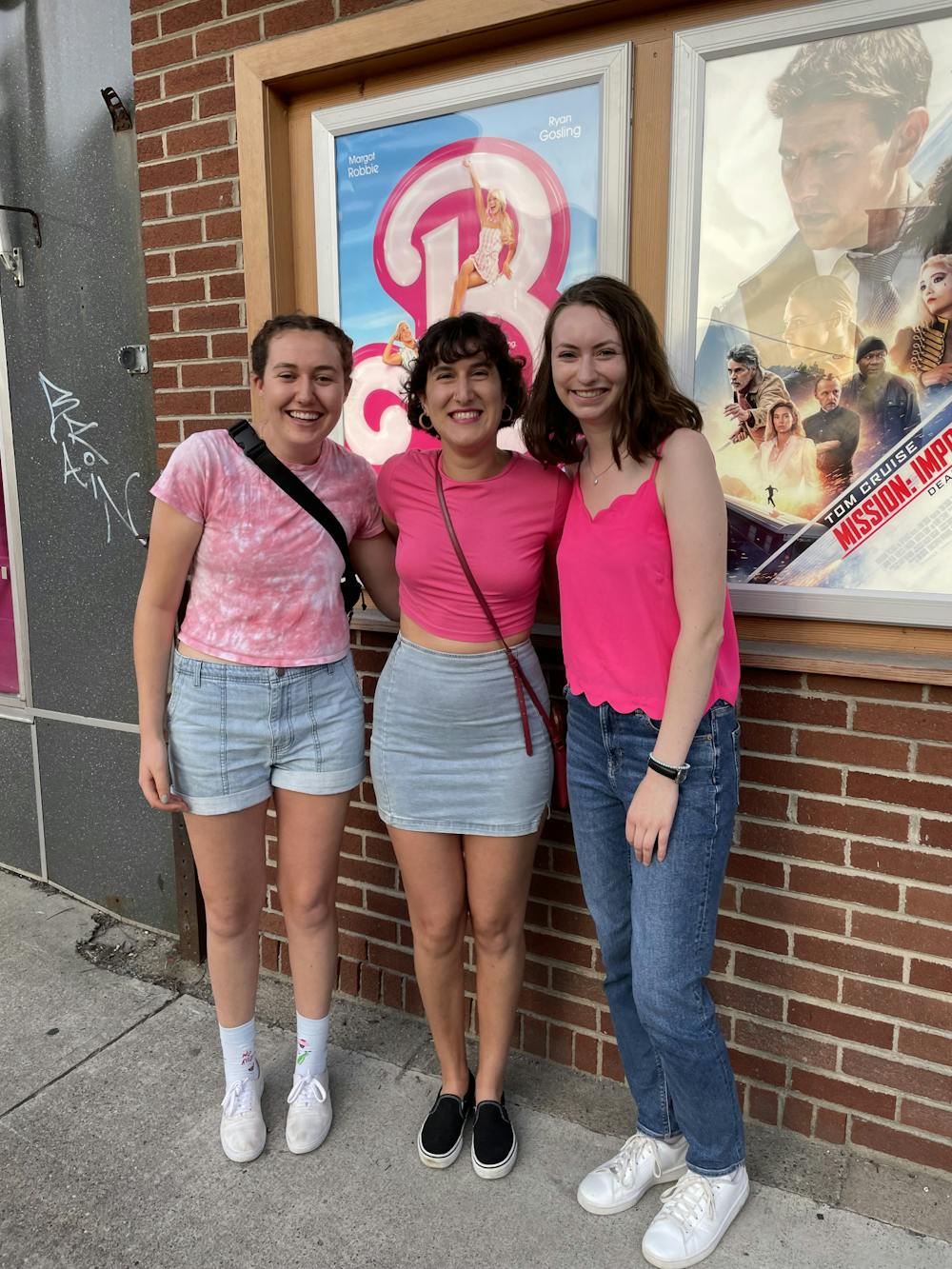Unquestionably the movie of the summer, Greta Gerwig’s “Barbie” supplied that oft-sought but rarely found commodity: crowd appeal.
On my walk to the Middlebury Marquis, I spotted college students, children and middle-aged parents alike — including my own father — threading through downtown in bright pink outfits. It’s a rare but welcome thrill to be able to identify your co-attendees outside the theater. I can’t remember the last time I dressed up for a movie, but it was probably when I wore an apron to my “Sound of Music” themed birthday. Although Barbie’s rival, “Oppenheimer,” didn’t arrive in Middlebury until August, foreclosing the spectacle of a “Barbenheimer” double feature, multiple Barbie and Barbenheimer-themed parties on campus revealed that enthusiasm levels for the event were still high. By day and by night, having even so much as a color in common created a preordained sense of community among strangers that was surprising and fun.
In a season equally marked by Taylor Swift’s $2.2 billion-earning Eras Tour, “Barbie” offered an outlet to those of us whose Eras experience was limited to Instagram. Beyond the economic parallels, Swift’s concert and Gerwig’s film both offered their predominantly-female audience a cathartic celebration. For example, Swift’s what-if song “The Man” and the much-quoted climactic speech delivered by Gloria, played by America Ferrera, in Gerwig’s film each use a highly stylized platform to speak to the pressures of modern womanhood. On a more basic level, the simple joy of a themed event with a pre-marked calendar date made it seem like summer had squeezed an extra holiday between the Fourth of July and Labor Day.
With so much of the “Barbie” experience occurring before or after showtime, the film itself almost gets overlooked in the rush of Barbiecore. It pays, however, to consider what happened between the opening montage and the credits.
For the unindoctrinated, “Barbie” follows stereotypical Barbie, played by Margot Robbie, on her journey from Barbie Land to the real world. Outside of her Barbie bubble, where the women have all the power, Barbie is confronted with the double-standards faced by actual 21st-century women. Ultimately, she must take action or allow Barbie Land to be overruled by the patriarchy-crazed Kens.
I had a wonderful time at my Marquis screening. The movie’s blinding aesthetic was exactly as advertised, and the star-studded cast rose to the expectations. Robbie’s stereotypical Barbie had us rooting for her despite her naïveté, and Ken, played by Ryan Gosling, managed to be simultaneously likable and ridiculous — no easy feat.
Some may have been turned off by the self-aware feminist comedy, feeling that it was too on-the-nose, but I found it funny and refreshing. For example, in the film’s most talked-about joke, the narrator, played by Helen Mirren, makes a tongue-in-cheek comment about how Robbie is miscast if you want to comment on unrealistic beauty standards. Marquis attendees of all ages burst into laughter. It is tempting to critique the film’s simultaneous celebration and critique of Barbie as noncommittal, but ultimately this very quality is what makes it such a crowd-pleaser.
One unsung aspect of the film was, in fact, the singing.
How many social commentaries also claim to be musicals? While musical was certainly not “Barbie’s” primary classification, Ken’s genre-defying rock ballad, “I’m Just Ken,” turns the film in a new direction with its parody of musical theatre’s typical 11 o’clock number. The song currently has more than 65 million streams on Spotify.
Although music is highlighted elsewhere in the film, including during Lizzo’s introductory “Pink” and the elaborate choreography to Dua Lipa’s “Dance the Night,” “I’m Just Ken” marks a break from more diegetic songs that are used to define the setting. In contrast, Ken’s solo moment is the film’s most overtly non-diegetic moment as a main character sings his thoughts.
Noah Baumbach, Gerwig’s partner and a “Barbie” co-writer, has introduced late-stage songs in past work. In 2019’s “Marriage Story,” featuring an otherwise wordless soundtrack by Randy Newman, the two protagonists each perform a number from Stephen Sondheim’s “Company!,” shedding new light on their emotional situations. Baumbach’s method of exposing internal thought through song is unconventional in non-musicals but can be used to great effect. While it has a sobering, sympathy-inducing effect in “Marriage Story,” Ken’s “West Side Story”-esque dance battle toes the line between mocking and humanizing him. This reinforces the film’s desire to have things both ways. I would appreciate seeing more exploration of this kind across non-musicals.
My qualms with the film, if I must mention them, were the following:
I didn’t like the ending. Sure, the buzzer-beater gynecologist joke made me laugh, but I’m not sure I wanted Barbie to become human. She loses her magic if she becomes just like us. The Harry-and-Dumbledore-at-King’s-Cross-esque unreality and Barbie’s subsequent transformation were sweet (the montage certainly had theatergoers tearing up), but after she spent a movie trying to fix her homeland, I was sad to see Barbie abandon it.
My other qualm was that I didn’t grasp the role of the Mattel corporation in this movie. The bumbling execs lived up to that adjective but didn’t add much to the story, and the degree of their power over their creation was left unclear. Their role could have used tightening up or eliminating.
The news about Gerwig’s record-breaking box office numbers which earned her the title highest-grossing U.S. female director of all time is delightful. I certainly would watch this movie again. Sweet with a kick, if “Barbie” were a beverage, it would be strawberry lemonade. What could be more perfect for a hot summer’s day?

Acadia Klepeis ’24 (she/her) is an Arts & Culture Editor.
She is an English major and a French and Francophone Studies minor. Last year, Cadi studied literature in Paris and in Oxford through Middlebury’s school abroad programs. She spent this past summer working as a communications intern for the Vermont Arts Council. Previously, she completed internships with Tuttle Publishing, Theatre in Paris, and Town Hall Theater. Cadi is also on the board for Middlebury College Musical Theatre.




